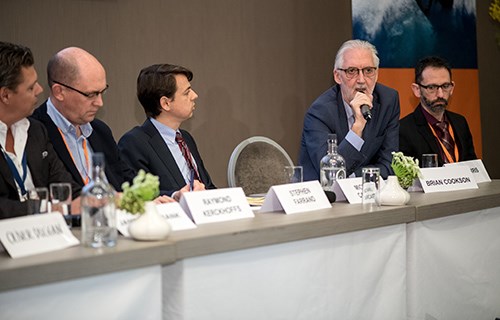Professional cycling is at risk of losing pace

Panel discussions at Play the Game 2017. Photo: Thomas Søndergaard/Play the Game
28.11.2017
By Steve MenaryThe 18 main teams on the World Tour have a combined budget of more than 350 million euros, but a former president of the Union Cycliste Internationale (UCI) said that the sport’s “fundamental weakness is the lack of money”.
Brian Cookson, whose reign as UCI president ended in a landslide election defeat in September, said: “We are used to consuming cycling for free, but we can’t consume any other sport for free.”
Cookson rhetorically questioned whether cycling could survive on subscription television but said that the reliance solely on sponsors was not good for the sport in a session titled ‘Transforming the Business of ProCycling’.
In response, Oliver Duggan from sportswear manufacturer Rapha said that there was no need for polarised positions between pay TV and free-to-air.
“There is a hybrid between the two and different content on offer depending on what you pay,” said Duggan, who is working on a report on how professional cycling is set up.
The report, which has been researched in conjunction with the University of Leuven and The Outer Line, an initiative working to improve the governance of pro cycling, has involved interviews with more than 50 stakeholders and will be published in February.
James Fairbank, head of brand at Rapha, argued for expanding the role of sponsors in the governance of pro-cycling.
“It’s quite antiquated, the way [cycling] is set up and we believe there are a number of changes that could be made. If cycling doesn’t make the changes, the sport could suffer and that would affect us profoundly,” Fairbank said.
The Roadmap from Rapha, The Outer Line and Leuven University will be published in three versions from a 30,000-word document to a single page and will cover governance, formats, management of teams, brand revenue and economic drivers, and the role of the media.
The conservative nature of cycling
The increasingly conservative nature of cycling teams towards the media is damaging the sport, argued cycling journalists Raymond Kerckhoffs and Stephen Farrand, who criticised teams signing exclusive deals with media and the damaging impact of fake news and social media.
“Teams only bring positive news and are restricting access to try to control the narrative,” said Kerckhoffs, a journalist with Dutch newspaper De Telegraaf.
The duo proposed the creation of a new Department involving all stakeholders in the sport to help bring the sport to a wider audience and stop the increasing trend in cycling coverage of ‘insiders talking to insiders’, which is limiting the audience.
“All the parties have to work together,” said Kerckhoffs, but Michael Carcaise, executive director of the Association of North American Professional Road Cyclists union, provided examples of how this is not happening.
Carcaise highlighted an underrepresentation of athletes within the UCI and the weakness of the riders’ union, the Cyclistes Professionels Associés (CPA).
“Athletes do not have a say to elect members of the UCI management committee, only the national federations,” said Carcaise, who was critical of the make-up of the UCI’s athletes commission with nine types of cycling represented and meetings only held once a year.
He added: “Diversity is a weakness. A mountain biker rider, for example, can’t decide whether to have eight riders of not in a Tour de France team. The current deficit is a challenge for the UCI, who need to encourage athletes to have a greater involvement in their sport.”
Responding to the series of arguments presented, Cookson welcomed the Rapha research, described the idea for a new joint Department as “interesting” and said the CPA could be stronger, but added that: “Part of the problem with involving athletes is that they do not often have the time or inclination.”
Cookson insisted that the UCI had made great strides in repairing its reputation after a series of doping scandals and that the future could be “quite good” but admitted that change was needed in areas such as reducing the time-span of some races from three to two weeks. His fellow panellists had other changes in mind.

Read more about Play the Game 2017





